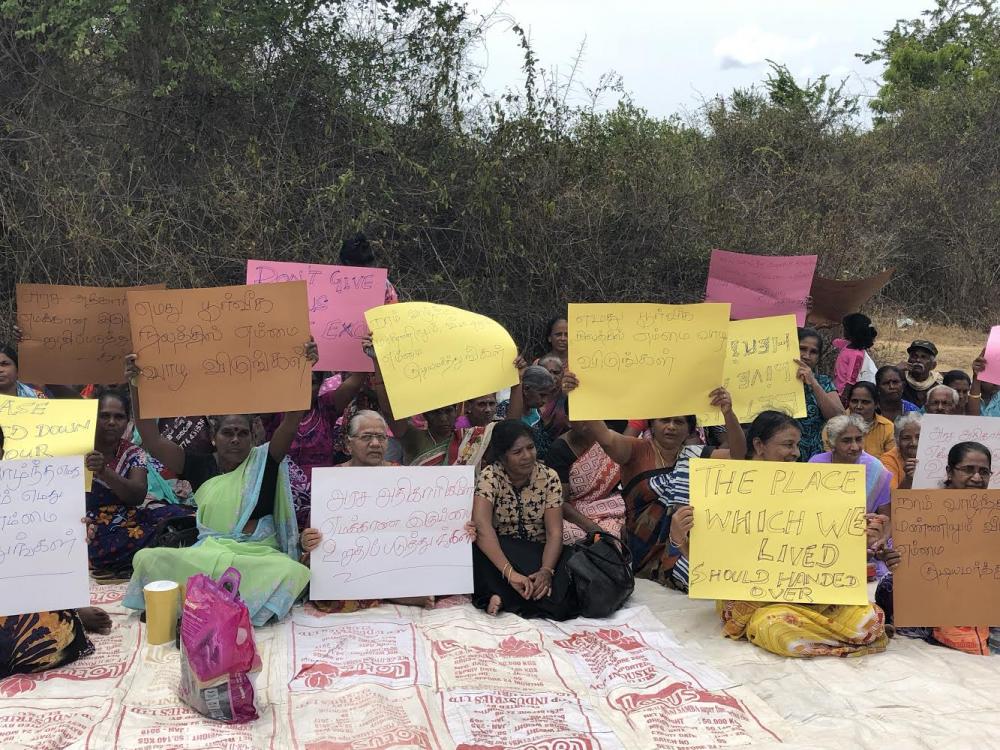The former head of Sri Lanka’s army has slammed attempts to release military held lands in the North-East to Tamil civilians as “stupid” and vowed to block any attempts at demilitarisation of the region, as Tamil calls for the army to leave continue.
In an interview with the Daily Mirror, Mr Fonseka, who is the first Sri Lankan Army officer to be promoted to the rank of Field Marshal and a minister in the current government, criticised any attempt to release military held land.
“I have heard the Army Commander boasting about the reduction of land occupied by the military, handing over land back to people and closing down so many camps,” he said. “That is stupid.”
“You cannot be so proud that you close down every camp and hand over every inch of land back to people.”
“You must not do it due to political pressure. You must do it methodically. Now the Army Commander is trying to please the politicians by pulling out the military. I hear from some of the ground Commanders that some are not happy about the way he is closing down camps. That is a problem.”
Mr Fonseka drew on his own experience from the military, stating that he had previously refused to release military occupied lands to Tamil civilians in Jaffna.
“Politicians are not educated on military deployment,” he stated. “They do not understand it. Long ago, in 2002, I was the Jaffna Commander. I was asked by the Government to close down some areas of the High Security Zones. I was a Major General at that time. I refused it considering the security situation.”
His comments come as Tamil protests calling for the army to release military occupied lands continue. Last week, a protest began in Amparai with villagers demanding resettlement in their land which is currently being occupied by the Sri Lankan military.
Also last week, the UK announced it will provide £1 million in funding for families resettling back into their lands following the release of land from military occupation in Jaffna, Kilinochchi, Mullaitivu and Batticaloa.

Villagers in Amparai demand the military release their land in a protest last week.
In his interview, Mr Fonseka, went on to pledge that he would stand against any reduction in the size of the Sri Lankan armed forces.
“Some Tamil politicians talk about removing the military from the north,” he said. “We cannot give into such pressure without any basis. You cannot remove the military from the country.”
“The military needs presence everywhere in the country. You cannot say the military must be in the south not in the north. Downsizing is not required in my opinion. In my personal view, the minimum strength of the Army should be maintained above 150,000. It is not only an internal problem. The country’s military must be ready to face any threat including the external threat.”
His comments come amidst intense militarisation in the North-East, with the military heavily involved in civilian activities in the region. A report by the Adayaalam Centre for Policy Research (ACPR) and People for Equality and Relief in Lanka (PEARL) published at the end of last year found that in regions such as Mullaitivu, there is at least one Sri Lankan soldier for every two civilians.
He also commented on hopes of devolution on the island, blaming Tamil politicians for “trying to play it to the gallery”.
“They still try to talk about separatism,” he said. “That cannot be allowed. Sinhala people in the south will not agree to that. As for power devolution, we will have to go for a referendum if it is to be done. The majority of the people are against it.”
See the full interview here.
We need your support
Sri Lanka is one of the most dangerous places in the world to be a journalist. Tamil journalists are particularly at threat, with at least 41 media workers known to have been killed by the Sri Lankan state or its paramilitaries during and after the armed conflict.
Despite the risks, our team on the ground remain committed to providing detailed and accurate reporting of developments in the Tamil homeland, across the island and around the world, as well as providing expert analysis and insight from the Tamil point of view
We need your support in keeping our journalism going. Support our work today.
For more ways to donate visit https://donate.tamilguardian.com.

